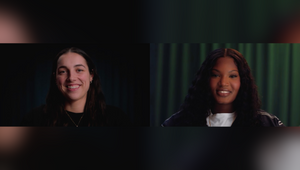
It's Not Even Funny

The year: 2006.
The place: Urban Outfitters on 14th Street.
The crime: telling a bad joke to my now-wife.
You can guess how the next few seconds unfold; she rolls her eyes, I insist - aloud, too loudly it turns out - that it was funny; c’mon it was; at least a little; and then a hand - an especially consequential one - falls on my shoulder.
Falls is wrong; it suggests a gentle drift, elegance about it, an index finger alighting on my plaid shacket. The fact is: I was jabbed, straight up, Hey Dummy Energy all the way; or maybe that’s how I remember it. Because the comedian, who I recognize from movies and TV, to whom these aggressive digits belong, says something that not only knocks me back but sets in motion a chain of thoughts and events that results in you reading this instead of doing something far more important; relax, you’ll get to it.
She says—referring to my aforementioned joke—“That was clever. But it wasn’t funny.” And then withdraws her dagger, picks up an adult coloring book, and makes her way to the register. What she leaves in her wake is a rattled, maybe leveled young creative, whose rapidly firing neurons process for the first time that there’s a distinction between the two; that one is logical, that the other transcends logic. That one is an exercise in architecture and the other an act of demolition. It had never seemed so obvious until that moment but from Urban on, the difference stuck with me. And so did a proclivity for parsing the clever from the funny—in the work that I would do and consume.
Okay, now let’s fly forward almost two decades. I’ve not only pedaled my wares as a writer, selling (what I think are funny) shows to Dreamworks and Viacom, I’ve also come up at Giant Spoon, where we help brands find new ways to talk to people–and new people to talk to. What we see fascinates us. After decades of delivering arched eyebrows of campaigns, ads that are clever or absurd in their cerebral ways, luxury and premium ready-to-wear brands are doing something new. They’re embracing the funny that had eluded me those years ago. Loewe is making hilarious content in partnership with Dan Levy and Aubrey Plaza. Kid Super is putting stand-ups on the runway and Ronnie Fieg is dressing Jerry Seinfeld in Kith. Funny, funny people, and places where funny happens are having an impact in venues where funny was absent. Amazing, but why?
Hold my message tee shirt.
The knee-jerk answer is tonal disruption. Unique creative choices stop our thumbs and command our eyeballs. Which is, sure, tough to dispute but feels insufficient. Maybe we love seeing bulls invited to china shops, so they can do what bulls do: reduce precious objects to jagged shards. Satisfying to watch; and in those ruins, brands may find the barriers to entry that had previously discouraged people from shopping them. There’s a chance courage plays a role. In 2024, every comedian who takes the stage is one fragile spectator away from an open-handed slap; and guts do beget glory.
But consider the possibility that it’s something more.
Consider that every brand - even the most aspirational of them - is looking to forge a connection with prospective customers, to show them there’s a place in that brand’s universe for those customers to reside. And that comedy, and comedians, not only expose premium brands to new audiences, but expose new facets of those brands to the world. In other words: there is more opportunity for people to say: I like you and I’m like you, we laugh the same way, I can hold space for silliness and sexiness, and maybe I see silliness as sexiness, too. It’s an invitation and a point of entry, an underexploited one. And if fashion can do it, why not hospitality, travel, spirits, auto? Giant things happen when luxury steps off the pedestal and toward the microphone. If you disagree, feel free to tap me on the shoulder.
It wouldn’t be the first time.















